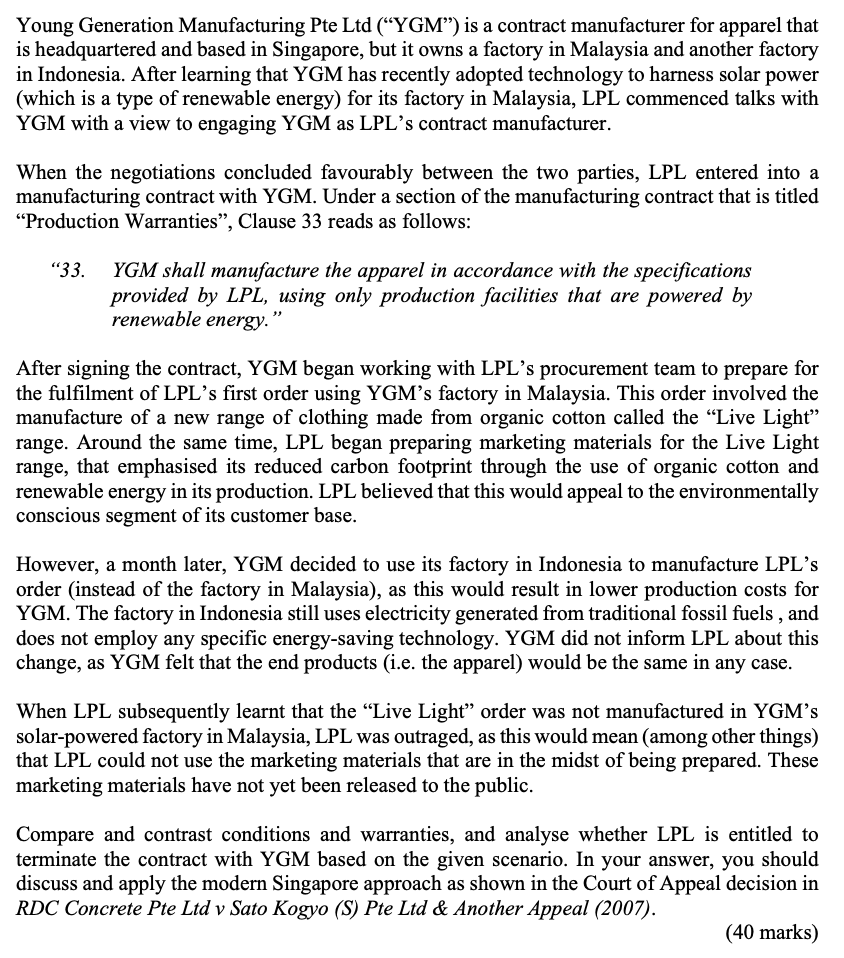THERE IS NO LAW SUBJECT THEREFORE I POSTED IT HERE
THE LAW SUBJECT IS CONTRACT AND AGENCY LAW.
THANK YOU


Liviery Pte Ltd ("LPL") is a company in Singapore that retails "fast fashion", which refers to relatively inexpensive apparel that is mass-manufactured in response to the latest trends. LPL is seeking to make its supply chain more environmentally friendly by sourcing its apparel from contract manufacturers that employ energy-saving technologies or renewable energy in the manufacturing process. Young Generation Manufacturing Pte Ltd ("YGM") is a contract manufacturer for apparel that is headquartered and based in Singapore, but it owns a factory in Malaysia and another factory in Indonesia. After learning that YGM has recently adopted technology to harness solar power (which is a type of renewable energy) for its factory in Malaysia, LPL commenced talks with YGM with a view to engaging YGM as LPL's contract manufacturer. When the negotiations concluded favourably between the two parties, LPL entered into a manufacturing contract with YGM. Under a section of the manufacturing contract that is titled "Production Warranties", Clause 33 reads as follows: "33. YGM shall manufacture the apparel in accordance with the specifications provided by LPL, using only production facilities that are powered by renewable energy." After signing the contract, YGM began working with LPL's procurement team to prepare for the fulfilment of LPL's first order using YGM's factory in Malaysia. This order involved the manufacture of a new range of clothing made from organic cotton called the "Live Light" range. Around the same time, LPL began preparing marketing materials for the Live Light range, that emphasised its reduced carbon footprint through the use of organic cotton and renewable energy in its production. LPL believed that this would appeal to the environmentally conscious segment of its customer base. However, a month later, YGM decided to use its factory in Indonesia to manufacture LPL's order (instead of the factory in Malaysia), as this would result in lower production costs for YGM. The factory in Indonesia still uses electricity generated from traditional fossil fuels, and does not employ any specific energy-saving technology. YGM did not inform LPL about this change, as YGM felt that the end products (i.e. the apparel) would be the same in any case. When LPL subsequently learnt that the "Live Light" order was not manufactured in YGM's solar-powered factory in Malaysia, LPL was outraged, as this would mean (among other things) that LPL could not use the marketing materials that are in the midst of being prepared. These marketing materials have not yet been released to the public. Compare and contrast conditions and warranties, and analyse whether LPL is entitled to terminate the contract with YGM based on the given scenario. In your answer, you should discuss and apply the modern Singapore approach as shown in the Court of Appeal decision in RDC Concrete Pte Ltd v Sato Kogyo (S) Pte Ltd \& Another Appeal (2007). (40 marks)








